Adrian Collins's Blog, page 48
July 23, 2024
REVIEW: Gilgamesh by Emily H. Wilson
Emily H. Wilson’s Inanna was one of the most interesting debuts of 2023 (you can find our review here and our interview here). Now, she’s returned with the second volume in her Sumerians trilogy, Gilgamesh. We’re once again drawn into the books’ rich world, full of vivid detail. Wilson’s work straddles the fine line between historical novel and myth. Gilgamesh takes itself seriously, and I would argue, sees itself grounded in history as written in ancient texts, eschewing more traditional ideas of what constitutes fantasy. It is a wonderfully evocative novel and I’m looking forward to seeing how the story concludes in the third book.
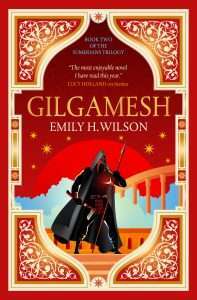 While Inanna was the story of the eponymous goddess coming of age, Inanna has become her adult, her mythical self in Gilgamesh. Funnily enough, Gilgamesh himself is only one of a range of characters in this volume rather than being the focal character as much as Inanna was. Here, Wilson presents a complex story, feathering out in many plot threads that start coming back together towards the end of the book. In that sense, Gilgamesh is a true second book in a trilogy – it can’t stand on its own merit and the story ends on a sense of uncertainty. I would recommend reading this series in sequence, or even rereading Inanna before Gilgamesh. I wish I had thought to do that as it would have been easier to see ongoing strands and nuances.
While Inanna was the story of the eponymous goddess coming of age, Inanna has become her adult, her mythical self in Gilgamesh. Funnily enough, Gilgamesh himself is only one of a range of characters in this volume rather than being the focal character as much as Inanna was. Here, Wilson presents a complex story, feathering out in many plot threads that start coming back together towards the end of the book. In that sense, Gilgamesh is a true second book in a trilogy – it can’t stand on its own merit and the story ends on a sense of uncertainty. I would recommend reading this series in sequence, or even rereading Inanna before Gilgamesh. I wish I had thought to do that as it would have been easier to see ongoing strands and nuances.
I did particularly enjoy a scene where Ereshkigal, the goddess of the underworld, comes above ground for the first time in a hundred years. As she stands in the light, she notices a stark shift in perception. Where she considered herself well-groomed, regal and impressive before, the light makes her see how dirty and ragged she has become – showing that a contained physical space affects our capacity to reason and confines our mindset. And that sense of self-reflection permeates Gilgamesh. Every major character has at least one scene where they consider themselves, their role in the world and the why behind their actions. To me, that makes the book stand out. I’m a sucker for some good introspection and Wilson delivers. It’s especially poignant here as all characters could be perceived as villains or antagonists in their own right. There are no heroes, gods are presented as people rather than removed deities and the story is dark. Wilson doesn’t shy away from darkness, cruelty or brutality, though the truly bad usually happens off-page. Having characters inflict pain and suffering with intent while aware of what they are doing, and considering it the right thing to do in that situation makes them strong characters with an emotional impact on the reader. I find sparse descriptions with ongoing reflection makes for harrowing reading, in a good way.
Still, there is a sense of hope and healing permeating the novel. Every single character is traumatised in some way, but they are actively working to cope with their past, and the healing power of company becomes clear. That said, the narrative voice wasn’t quite distinct enough. The story shifts perspective with each chapter, following various characters in close first person. These points of view aren’t substantially different in terms of voice so I found it hard to locate myself within the story when my attention slipped. This might be one to listen to in audio if that’s a medium that works for you as it might make the voices more distinct. Gilgamesh is worth the effort in any case, whisking the reader away to ancient Sumer with its dry humour, atmosphere and complex characters.
Read Gilgamesh by Emily H. Wilson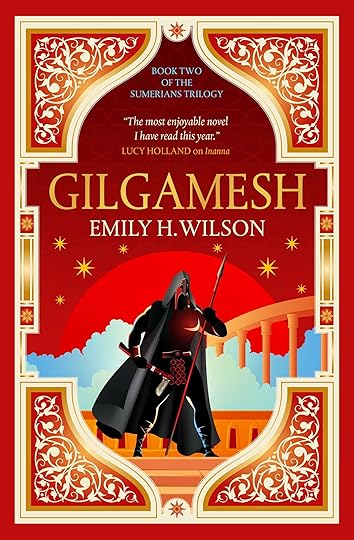 Read on Amazon
Read on AmazonThe post REVIEW: Gilgamesh by Emily H. Wilson appeared first on Grimdark Magazine.
July 22, 2024
REVIEW: Arthur by Giles Kristian
Arthur is the dramatic and emotional third entry in Giles Kristian’s thrilling The Arthurian Tales trilogy. After a striking and moving prologue, Arthur introduces readers to Beran. He is a grizzled old warrior who runs with a group of ruthless mercenaries. Beran is gruff, tough, and does not care much about anything. Give him someone to rob or kill for payment and he will follow orders with no questions asked. That is until his mercenary band are ordered by Queen Morgana to murder a boy. During the skirmish, someone from Beran’s past recognises him and this familiar figure’s dying plea is for Beran to save the child and take him to Camelot. Camelot is still standing strong against the Saxons whereas the rest of the Dark Isles is succumbing to the onslaught. Beran turns against the group of mercenaries, saving the boy, and they begin a dangerous trek to the legendary stronghold. The child could become someone of great importance and may even spark a small amount of hope in the disillusioned Beran. Throughout Arthur, they are pursued by Saxons, Queen Morgana’s forces, and a very pissed-off mercenary captain.
 Arthur works as a standalone and, in isolation, is an absorbing and gripping historical fiction read. I have read Lancelot and Camelot however my memories of these books are hazy. If I had read them more recently, I feel it would have increased my enjoyment of Arthur by about five percent. Arthur has two point of view perspectives. The first is the ‘present-day’ Beran storyline which features characters from mythology such as Saracen warrior Palamedes and the lovers Tristan and Isolde. The other viewpoint is of past events through the eyes of a young Arthur. Here, familiar characters such as Merlin, Gawain, and Uther are present as moments from Arthur’s formative years are depicted. As the novel progresses, similarities between a young Arthur and the rescued boy and his potential become clear. As I read further, it became engrossing to try and work out who Beran was in his past life before he was a mercenary and lost faith in humanity. He is a skilled fighter for his age, showcases fine horsemanship, and knew, in some capacity, famous warriors such as Galahad and King Constantine.
Arthur works as a standalone and, in isolation, is an absorbing and gripping historical fiction read. I have read Lancelot and Camelot however my memories of these books are hazy. If I had read them more recently, I feel it would have increased my enjoyment of Arthur by about five percent. Arthur has two point of view perspectives. The first is the ‘present-day’ Beran storyline which features characters from mythology such as Saracen warrior Palamedes and the lovers Tristan and Isolde. The other viewpoint is of past events through the eyes of a young Arthur. Here, familiar characters such as Merlin, Gawain, and Uther are present as moments from Arthur’s formative years are depicted. As the novel progresses, similarities between a young Arthur and the rescued boy and his potential become clear. As I read further, it became engrossing to try and work out who Beran was in his past life before he was a mercenary and lost faith in humanity. He is a skilled fighter for his age, showcases fine horsemanship, and knew, in some capacity, famous warriors such as Galahad and King Constantine.
Through the two timelines in Arthur, we see Kristian’s interpretation of the beginning and the end of this legendary age of warlords, battles, and kings. I was completely absorbed in Kristian’s working of this period. It is dark and gritty, and Britain is an uncertain place with many rulers, rival gods, and competing factions. Magic is presented well in Arthur too as the presence of the druids and the messages delivered by omens seeming more grounded in reality than some retellings. However, these occurrences are witnessed as otherworldly and mysterious to the inhabitants of Britain present in Arthur. These elements add to the complicated murkiness of the Britain on show. Furthermore, Kristian’s crafted world is hostile and unforgiving, and just because a character is either good or weak does not mean they are entitled to a happy ending.
Arthur contains many features I adore in well-crafted historical fiction tales. For example, there are gripping battles, vendettas to settle, pasts to escape from, a disgruntled protector figure, brotherhoods, friendships, honour and loyalty, and the high costs of fate, expectancy, and the weight of a nation on a set of shoulders. Kristian does some adept foreshadowing throughout the novel and the payoffs that I foresaw were highly satisfying. That being said, the finest moment was a twist I did not see coming. If I had to be more critical, I wish Arthur was longer, more complicated, and the ‘present-day’ action set over a longer timeframe. However, the immediateness and the pacing make it tough to put Arthur down.
To conclude, the two storylines are skilfully presented and equally important to the novel’s incredible and emotional conclusion. Arthur is a moving, atmospheric, and enthralling experience that culminates The Arthurian Tales in the best possible manner.
Read Arthur by Giles KristianThe post REVIEW: Arthur by Giles Kristian appeared first on Grimdark Magazine.
July 21, 2024
REVIEW: House of the Dragon Season 2 Episode 2
HOUSE OF THE DRAGON 2×2 “Rhaenyra the Cruel” is the second episode of the second season of HBO’s extended apology for the final season of GAME OF THRONES. Ha-ha. Just kidding, except not. Overall, I was a big fan of the first season, but I feel like the two year wait on the follow up killed a lot of forward momentum that the series had been accumulating and this is from a guy with a Targaryen wallet. Still, the first episode was gutsy enough to kill a toddler and I was invested enough to be there at 9PM Eastern on a Sunday for the next episode.
 The premise for this House of the Dragon episode is that everyone in Kings Landing is stunned by the assassination of Prince Jaehaerys. One of the failures of the previous season was the fact that they didn’t take episodes to follow up the emotional beats to the big epic changes of episodes. Instead, it just lightning shot past these big moments and the story was the lesser for it. Here, we get to see how the death of Jaehaerys has broken his father, Aegon II, and his mother, Helaena. We see how the death has stricken Ser Criston Cole and World’s Youngest Grandmother, Alicent Hightower, with guilt because they were making the beast with two backs when they should have been defending the royal family’s youngest.
The premise for this House of the Dragon episode is that everyone in Kings Landing is stunned by the assassination of Prince Jaehaerys. One of the failures of the previous season was the fact that they didn’t take episodes to follow up the emotional beats to the big epic changes of episodes. Instead, it just lightning shot past these big moments and the story was the lesser for it. Here, we get to see how the death of Jaehaerys has broken his father, Aegon II, and his mother, Helaena. We see how the death has stricken Ser Criston Cole and World’s Youngest Grandmother, Alicent Hightower, with guilt because they were making the beast with two backs when they should have been defending the royal family’s youngest.
The Greens have been rightly called out as the “villains” of House of the Dragon and consistently made to be an utterly despicable bunch of scumbags with rare exceptions. Many of their virtues from the books have been washed away and their sins have been made worse. Still, this is an episode that humanizes them a great deal while actually doubling down on their worst traits. After the previous episode showed a softer side of Aegon II, trying to do right by the common people, we see him engage in Joffrey level sadism by hanging a hundred rat catchers in hopes of catching one.
Honestly, this moment kind of fell flat for me because one of House of the Dragon‘s flaws is that it sometimes has its characters acting far too modern. Alicent and Rhaenyra acted like teenage girls when they were, well, teenage girls versus adult women as they would have been treated post-sixteenth birthday in Westeros. The hanging of the rat catchers is in Fire and Blood but almost an afterthought as killing a hundred Smallfolk is just not that big of a deal in this society. Here, it’s an atrocity that Otto acts like would live in infamy throughout Westeros history. Come on, people rarely remember that George Washington burned a bunch of villages during the Revolutionary War.
By contrast, I really liked how utterly devastating the charge of infanticide and kinslaying is to Rhaenyra’s cause. Because Rhaenyra is a woman who recently lost her child, everyone assumes she’s the one who sent assassins to kill Aegon’s son. Honestly, I was surprised the show had her react with unequivocal disgust because I’m inclined to think a woman of Westeros would see some small satisfaction in “blood for blood.”
Instead, Rhaenyra is disgusted by Daemon and figures out he was the party responsible very quickly. Daemon also finally confesses his jealousy and petulance regarding his disinheritance for his wife. This would have been an excellent time to introduce Nettles to soothe Daemon’s wounded pride, but they still haven’t cast her and may even end up removing her (which would be a mistake, IMHO). We also get a good moment where Rhaenyra realizes her jealousy and distaste for Mysaria is unqueenly before pardoning the woman. It pays dividends because Mysaria then warns Rhaenyra about Aegon’s ill-planned attempt to avenge his son.
I was really impressed by Emma D’Arcy’s acting this time around and think they did a fantastic job confronting Daemon. Daemon is a great Grimdark Protagonist, morally despicable but always fascinating, yet it’s nice to see him put in his place by calling out all of his selfish petty qualities. We may love him but it doesn’t mean everyone in-universe isn’t sick of his nonsense.
The best parts of this episode are probably Prince Jaehaerys’ funeral procession and the Battle of the Cargyll Twins. House of the Dragon 2×2 does a fantastic job showing Queen Helaena’s grief as she’s forced to become a propaganda point to the common people. She’s clearly agoraphobic and hates crowds yet is moved through crowds of weeping strangers who scare the living hell out of her with her son’s corpse just a few feet away. Arryk and Erryk Cargyll have a fight to the death as the twins find themselves divided by their loyalties. Ser Criston Cole sends Arryk on a suicide mission to soothe his own guilt and this leads to horrible tragedy for the Kingsguard. Almost as good as these two moments is Ser Otto Hightower having the realization that Aegon is uncontrollable and a monster, which means that his efforts to prevent war via crowning him were not only doomed but counterproductive.
Truly, Ser Criston Cole is developing quite the hatedom in the fandom (in a “love to hate” good writing sort of way) that probably rivals Joffrey. He’s a distressingly “real” villain with all the hypocrisy, self-delusion, projection, and petty cruelty of many figures in power. People who keep insisting that all of their failures are someone else’s doing and, unfortunately, being rewarded by falling upwards.
In conclusion, House of the Dragon 2×2 “Rhaenyra the Cruel” was an excellent follow up to a strong first episode. There’s a lot of character moments and strong dramatic heft, which is what we’re here for in the first place. As much as I love dragon fights, I’d rather they remain more devoted to getting to know all of these wacky incest royals.
The post REVIEW: House of the Dragon Season 2 Episode 2 appeared first on Grimdark Magazine.
July 20, 2024
REVIEW: Abigail
Abigail is a 2024 slasher movie that is full of twists and turns regarding its titular character. It is full of likable characters, an interesting setting for the murders, and a lot of new takes on a very traditional monster archetype.
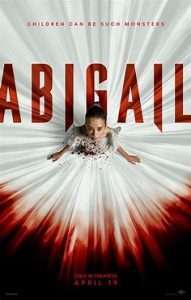 Abigail, unfortunately, blows its chief surprise in the trailer and it is something that I can’t imagine would be kept under wraps for most audiences but would improve the film tremendously if you don’t know it. It’s still worth seeing if you have been spoiled and I had a lot of fun knowing the “twist” from the beginning but my nieces, who didn’t know, had their enjoyment magnified a huge amount. So, if possible, read this review and take friends to see this movie or show it without spoiling it. But if not, don’t worry about it.
Abigail, unfortunately, blows its chief surprise in the trailer and it is something that I can’t imagine would be kept under wraps for most audiences but would improve the film tremendously if you don’t know it. It’s still worth seeing if you have been spoiled and I had a lot of fun knowing the “twist” from the beginning but my nieces, who didn’t know, had their enjoyment magnified a huge amount. So, if possible, read this review and take friends to see this movie or show it without spoiling it. But if not, don’t worry about it.
The spoiler that isn’t really a spoiler if you’ve heard anything about this movie, really, is that it is a film about a bunch of low-life criminals abducting a little girl named Abigail (Alisha Weir). Said little girl is a vampire and rapidly turns the tables on her abductors. Some of the abductors aren’t complete scumbags, though. Some of them are really convinced that they’re not going to do any harm to this young bloodsucking horror and don’t deserve to be exsanguinated. Theoretically.
Abigail is essentially a slasher movie, but the set-up is extremely entertaining. All the thieves are well-developed and entertaining. Joey (Melissa Barrera), Frank (Dan Stevens), Rickles (Will Catlett), Sammy (Kathryn Newton), Peter (Kevin Durand), and Dean (Angus Cloud). Yes, as you can gather, they’re going by Rat Pack-inspired aliases. Joey is the assumed Final Girl, being the only one who has any bond with Abigail, but she’s appropriately flawed to the point you think she might die as well.
Abigail is very smart in how it justifies most of the slasher cliches as well. Lambert (Giancarlo Esposito), the man who hired them to kidnap Abigail, collects all of their cellphones before leaving. They’re hiding out in a creepy mansion because that is where they were instructed to bring the little girl. The mansion is also locked down because, of course, this is the feeding ground of a vampire that she wants to hunt them through.
I could share the twists and turns of the film but it’s exactly what you expect beyond the point that Abigail reveals herself to be the hunter rather than the hunted. Her performance is excellent, and the actress manages to convey a sadistic yet ultimately likable undead monster. This is guilt-free eating for her because all of these criminals were willing to kidnap a child for ransom. Why should she feel guilty for tearing them apart? Which, honestly, is a compelling argument.
Abigail isn’t perfect. Joey has an extremely charismatic and likable actress, but her moral indignation flaws flat given she chose to participate in this kidnapping in the first place. I’m of the mind that Sammy, the hacker, is the least cruel one since she’s seemingly unaware of just how bad of an action this is done. Indeed, he fact that Dan Stevem’s Frank is such an unapologetic scumbag who wants to kill Abigail before they know she’s a vampire makes him one of the more humorous characters.
In conclusion, Abigail is a fun movie and while it doesn’t reinvent the slasher movie, it’s certainly a fun time from beginning to end. Alisha Weir is adorable and menacing in equal measure that, even at age fourteen, I could easily see them doing a sequel to this film to before she ages out of the role.
The post REVIEW: Abigail appeared first on Grimdark Magazine.
July 19, 2024
REVIEW: The Dead Cat Tail Assassins by P. Djèlí Clark
The Dead Cat Tail Assassins by P. Djèlí Clark is the story of a crew of undead assassins. Despite the title, there are fortunately no dead cats or loose cat tails involved in this gambit, so the animal lovers among you can rest safely. While Djèlí Clark has been fairly prolific in recent years, this marks a departure from his previous work. He is best known for Dead Djinn universe, a setting rooted in history and colonialism – an alternative Cairo from the early 20th century. As his previous work was in conversation with places, times and settings familiar to the reader, it allowed him to discuss civil rights and colonialism without the story feeling overloaded. As a purely second-world fantasy story, The Dead Cat Tail Assassins an interesting, and slightly jarring, reading experience, wearing its politics much less obviously.
Tal Abisi’s guild of Dead Cat Tail Assassins are sworn to the Matron of Assassins, resurrected – and their memories of who they used to be obliterated. They are a blank canvas for the guild to shape, abiding by strict rules. Eveen (the Eviscerator) is one of these assassins. She’s never missed a mark and follows the laws to the letter (no, she’ll not think about whether the assassination is just, or abandon a job. Ever). That is, until a job takes and unexpected twist and she is forced to reconsider her role in the grand scheme of things and question Aeril’s will.
First of all, The Dead Cat Tail Assassins was clearly a ton of fun to write – you can feel the palpable excitement coming off the page. It is no less fun to read. The story is fast paced, with a clear mystery and story progression. Nevertheless, I found the novella format didn’t quite fit this story. I think it would be a very strong concept for either a short story, or to expand in a full-length novel. As it is, the reader receives both too little information for true depth and too much information that seems to relate only tangentially to the story and worldbuilding. Likely, much of my feelings on this stem from coming at the story with very high expectations. I was convinced I would love The Dead Cat Tail Assassins as much as I did The Master of Djinn. My preconceived notions made me struggle with the story in front of me and come away feeling unsatisfied – despite having a great time reading it. It felt like it was just not quite finished in many ways.
As with the rest of his work, The Dead Cat Tail Assassins is in constant conversation with Black storytelling, with conventions and concepts that are rooted in those cultures. In his other life, Djèlí Clark is an academic historian, which shows in his fiction writing. In the case of The Dead Cat Tail Assassins, I loved how his divine element refers back to the concept of powerful ghostly ancestors, both through story and through a linguistic and stylistic shift. In my case, Djèlí Clark’s attempt to jar the reader and tell story through more than just plot was successful – it made The Dead Cat Tail Assassins a surprising and interesting reading experience, especially from a craft perspective. Djèlí Clark is one of the voices of our generation of SFF, showcased with a novella that seems light but has been thought-provoking, even months after I initially read it.
Read The Dead Cat Tail Assassins by P. Djeli ClarkThe post REVIEW: The Dead Cat Tail Assassins by P. Djèlí Clark appeared first on Grimdark Magazine.
The best dark fantasy and science fiction books of 2024 so far
The first half of 2024 has proven to be yet another brilliant year for fans of dark and grimdark fantasy and science fiction. From brutal vampire societies, to AI cities dying, insects at war, and some good ol’ fashioned dragon slaying, there is something on our list for just about everybody. We are incredibly fortunate to have been provided with heaps of amazing review opportunities so far this year, and from that we give you our team’s choices for the best of dark and grimdark SFF so far in 2024.
Empire of the Damned by Jay Kristoff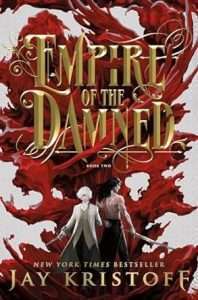 Empire of the Damned delivers many moments of high-intensity, including memorable showdowns, exchanges, and unpredictability, with very little going the way expected or in Gabriel’s favour. Certain scenes may arguably be over the top yet Empire of the Damned is an undeniably addictive and fun read.
Empire of the Damned delivers many moments of high-intensity, including memorable showdowns, exchanges, and unpredictability, with very little going the way expected or in Gabriel’s favour. Certain scenes may arguably be over the top yet Empire of the Damned is an undeniably addictive and fun read.
Read the rest of our review, here.
About the bookFrom holy cup comes holy light;
The faithful hands sets world aright.
And in the Seven Martyrs’ sight,
Mere man shall end this endless night.
Gabriel de León has saved the Holy Grail from death, but his chance to end the endless night is lost. Drawn into an uneasy alliance with the mysterious vampire Liathe, Gabriel must now deliver the Grail to ancients of the Blood Esani, and learn the truth of how Daysdeath might be finally undone.
But the Last Silversaint faces peril, within and without. Pursued by terrors of the Blood Voss, drawn into warfare between the Blood Dyvok and duskdancers of the frozen Highlands, and ravaged by his own rising bloodlust, Gabriel may not survive to see the Grail learn her truth.
And that truth may be too awful for any to imagine.
Read Empire of the Damned by Jay Kristoff, recommended by JamesThe Truth of Aleke by Moses Ose Utomi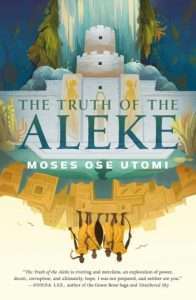 Utomi’s ability to cram such a dense and well-developed world in just over 100 pages is commendable and done with a fluid grace; it almost felt like reading a full-sized novel. The Truth of the Aleke was so well curated and detailed for its length, whilst simultaneously leaving me wanting more, having been overtaken by the curiosity the ending leaves us with.
Utomi’s ability to cram such a dense and well-developed world in just over 100 pages is commendable and done with a fluid grace; it almost felt like reading a full-sized novel. The Truth of the Aleke was so well curated and detailed for its length, whilst simultaneously leaving me wanting more, having been overtaken by the curiosity the ending leaves us with.
Read the rest of our review, here.
About the bookThe Aleke is cruel. The Aleke is clever. The Aleke is coming.
500 years after the events of The Lies of the Ajungo, the City of Truth stands as the last remaining free city of the Forever Desert. A bastion of freedom and peace, the city has successfully weathered near-constant attacks from the Cult of Tutu, who have besieged it for three centuries, attempting to destroy its warriors and subjugate its people.
Seventeen-year-old Osi is a Junior Peacekeeper in the City. When the mysterious leader of the Cult, known only as the Aleke, commits a massacre in the capitol and steals the sacred God’s Eyes, Osi steps forward to valiantly defend his home. For his bravery he is tasked with a tremendous responsibility―destroy the Cult of Tutu, bring back the God’s Eyes, and discover the truth of the Aleke.
Read The Truth of Aleke by Moses Ose Utomi, recommended by SabThe Book that Broke the World by Mark Lawrence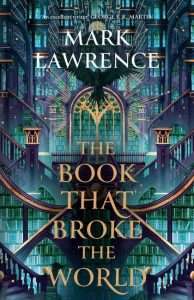 The Book That Broke the World is a triumph of imagination and a deeply thought-provoking meditation on the nature of memory, the value of knowledge, and the degree of self-determination we may or may not have in our lives.
The Book That Broke the World is a triumph of imagination and a deeply thought-provoking meditation on the nature of memory, the value of knowledge, and the degree of self-determination we may or may not have in our lives.
Read the rest of our review, here.
About the bookThe Library spans worlds and times. It touches and joins distant places. It is memory and future. And amid its vastness Evar Eventari both found, and lost, Livira Page.
Evar has been forced to flee the library, driven before an implacable foe. Livira, trapped in a ghost world, has to recover the book she wrote—one which is the only true threat to the library’s existence—if she’s to return to her life.
While Evar’s journey leads him outside into a world he’s never seen, Livira’s path will taker her deep inside her own writing, where she must wrestle with her stories in order to reclaim the volume in which they were written.
The secret war that defines the library has chosen its champions and set them on the board. The time has come when they must fight for what they believe, or lose everything.
Read The Book that Broke the World by Mark Lawrence, recommended by JohnThe Archive Undying by Emma Mieko Candon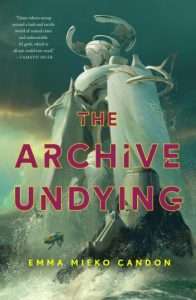 Deft of prose and evocative imagination, Emma Mieko Candon’s The Archive Undying unfolds an uncannily prescient promise: “When an AI god dies, its city dies with it.” This opening line sets the tone for a gripping narrative that binds elements of trauma, flesh-and-blood characters, and the mesmerising allure of the complex relationship between humanity and AI.
Deft of prose and evocative imagination, Emma Mieko Candon’s The Archive Undying unfolds an uncannily prescient promise: “When an AI god dies, its city dies with it.” This opening line sets the tone for a gripping narrative that binds elements of trauma, flesh-and-blood characters, and the mesmerising allure of the complex relationship between humanity and AI.
Read the rest of our review, here.
About the bookWHEN AN AI DIES, ITS CITY DIES WITH IT
WHEN A CITY FALLS, IT LEAVES A CORPSE BEHIND
WHEN THAT CORPSE RUNS OFF, ONLY DEVOTION CAN BRING IT BACK
When the robotic god of Khuon Mo went mad, it destroyed everything it touched. It killed its priests, its city, and all its wondrous works. But in its final death throes, the god brought one thing back to life: its favorite child, Sunai. For the seventeen years since, Sunai has walked the land like a ghost, unable to die, unable to age, and unable to forget the horrors he’s seen. He’s run as far as he can from the wreckage of his faith, drowning himself in drink, drugs, and men. But when Sunai wakes up in the bed of the one man he never should have slept with, he finds himself on a path straight back into the world of gods and machines.
The Archive Undying is the first volume of Emma Mieko Candon’s Downworld Sequence, a sci-fi series where AI deities and brutal police states clash, wielding giant robots steered by pilot-priests with corrupted bodies.
Come get in the robot.
Read The Archive Undying by Emma Mieko Candon, recommended by ArinaRiven Earth by Zammar Ahmer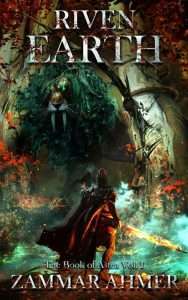 Nature and humanity clash in Zammar Ahmer’s Riven Earth, a breathtakingly epic yet intimately character-driven grimdark fantasy that will sink its roots into the hearts of everyone who loves a good dose of heavy emotional destruction with their fantastical adventures.
Nature and humanity clash in Zammar Ahmer’s Riven Earth, a breathtakingly epic yet intimately character-driven grimdark fantasy that will sink its roots into the hearts of everyone who loves a good dose of heavy emotional destruction with their fantastical adventures.
Read the rest of our review, here.
About the bookThe world has stopped turning.
Burned by a blazing sun. Thrust into eternal winter.
Life survives only in the Sunset Forest.
For untold millennia, mankind lived subservient to the dryads, forced into worship of the Earth-Mother, Astea. Then one man ventured into the Scorched Desert and returned with the secret of fire. His rebellion brought the dryad empire to ash. In its place, he founded the Kingdom of Heartsong.
Twelve years later, the new king is missing. The earth trembles. Famine ravages the land, and a mysterious illness creeps through the capital.
Plots of treason and revenge abound, but as the mistakes of the past bear fruit, men will reap what they have sown.
Read Riven Earth by Zammar Ahmer, recommended by EsmayThe Storm Beneath the World by Michael R. Fletcher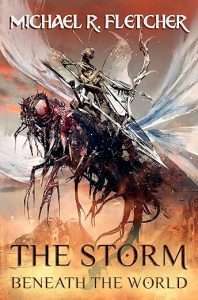 In Michael R. Fletcher‘s The Storm Beneath the World we get another full-swing-warhammer-to-the-chest of Fletcher’s wild imagination. In a world made up of insect queendoms living and warring on the backs of million-year-old creature-countries floating above the firestorm below, where to discover one has magical powers is to become a dangerous corrupt and rejected from society no matter the station you were born in to, we are treated to a wild ride through the eyes of a diverse group of ashkaro (insect characters) as they discover their world may come to an end amongst the chaos of their own changing lives.
In Michael R. Fletcher‘s The Storm Beneath the World we get another full-swing-warhammer-to-the-chest of Fletcher’s wild imagination. In a world made up of insect queendoms living and warring on the backs of million-year-old creature-countries floating above the firestorm below, where to discover one has magical powers is to become a dangerous corrupt and rejected from society no matter the station you were born in to, we are treated to a wild ride through the eyes of a diverse group of ashkaro (insect characters) as they discover their world may come to an end amongst the chaos of their own changing lives.
Read the rest of our review, here.
About the bookCursed by the gods, the insectile ashkaro live on flying islands travelling the eternal River of Days while a hellish firestorm devours the world below. Collected into queendoms, the higher caste brights live in the luxurious windward rain-forest while the servile dulls scrape out a desperate existence in the leeward desert.
Conflicts escalate between two neighbouring queendoms. Where Nysh embraces modern ideals of equality and independence, Yil honours the Fallen Goddess by enslaving their neighbours and maintaining traditional castes.
In preparation for the imminent war, Nysh sends ashkaro youths with dangerous Talents to secret schools, training them as assassins and spies. Joh, a dull male with a Talent for suggestion, and Ahk, a bright female with a Talent for stealth, are torn from their families and thrown into the academy. The two naively believe that the biggest threat comes from the other students, not realizing the war has already begun.
United in purpose, divided by caste, they can only save the island from the Mad Queen by working together.
Read The Storm Beneath the World by Michael R. Fletcher, recommended by CarrieThe Woods All Black by Lee Mandelo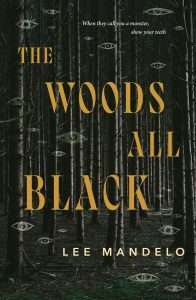 My best description for The Woods All Black is literary monsterfucking. It is one of the queerest stories I have ever read – and confronts its reader with their own complicity in contemporary oppression. In that, this is a very timely novel despite its 1920s setting and mentality. I beg you, read this one. The Woods All Black blew my mind and cemented Lee Mandelo as a king of modern gothic.
My best description for The Woods All Black is literary monsterfucking. It is one of the queerest stories I have ever read – and confronts its reader with their own complicity in contemporary oppression. In that, this is a very timely novel despite its 1920s setting and mentality. I beg you, read this one. The Woods All Black blew my mind and cemented Lee Mandelo as a king of modern gothic.
Read the rest of our review, here.
About the bookLeslie Bruin is assigned to the backwoods township of Spar Creek by the Frontier Nursing Service, under its usual mandate: vaccinate the flock, birth babies, and weather the judgements of churchy locals who look at him and see a failed woman. Forged in the fires of the Western Front and reborn in the cafes of Paris, Leslie believes he can handle whatever is thrown at him—but Spar Creek holds a darkness beyond his nightmares.
Something ugly festers within the local congregation, and its malice has focused on a young person they insist is an unruly tomboy who must be brought to heel. Violence is bubbling when Leslie arrives, ready to spill over, and he’ll have to act fast if he intends to be of use. But the hills enfolding Spar Creek have a mind of their own, and the woods are haunted in ways Leslie does not understand.
The Woods All Black is a story of passion, prejudice, and power — an Appalachian period piece that explores reproductive justice and bodily autonomy, the terrors of small-town religiosity, and the necessity of fighting tooth and claw to live as who you truly are.
Read The Woods All Black by Lee Mandelo, recommended by FabienneThe Dragons of Deepwood Fen by Bradley P. Beaulieu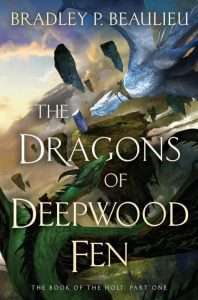 A multiple-point-of-view fantasy novel with some of the coolest dragons I have read about in ages, The Dragons of Deepwood Fen was a great read from start to finish.
A multiple-point-of-view fantasy novel with some of the coolest dragons I have read about in ages, The Dragons of Deepwood Fen was a great read from start to finish.
Read the rest of our review, here.
About the bookThis first book in a new fantasy series from the author of the acclaimed Song of the Shattered Sands series follows an unlikely pair as they expose the secrets at the heart of the mountain city of Ancris.
Lorelei Aurelius is the smartest inquisitor in the mountain city of Ancris. When a mysterious tip leads her to a clandestine meeting between the Church and the hated Red Knives, she uncovers a plot that threatens not only her home but the empire itself.
The trail leads her to Rylan Holbrooke, a notorious thief posing as a dragon singer. Rylan came to Ancris to solve the very same mystery she stumbled onto. Knowing his incarceration could lead to the Red Knives achieving their goals, Lorelei makes a fateful decision: she frees him.
Now branded as traitors, the two flee the city on dragonback. In the massive forest known as the Holt, they discover something terrible. The Red Knives are planning to awaken a powerful demigod in the holiest shrine in Ancris, and for some reason the Church is willing to allow it. It forces their return to Ancris, where the unlikely allies must rally the very people who’ve vowed to capture them before it’s too late.
Explore the mountain city of Ancris, where fast-paced adventure and intrigue abound, in this new offering from the author of the acclaimed Song of the Shattered Sands series.
Read Dragons of Deepwood Fen by Bradley P. Beaulieu, recommended by FionaUnexploded Remnants by Elaine Gallagher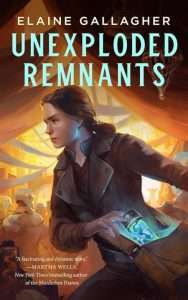 This novella is great fun, both thought provoking, action packed and rattles along at a brisk pace with evocative writing that offers plenty of description but doesn’t linger overly on exposition. If I had a criticism it’s that Unexploded Remnants left me wanting more.
This novella is great fun, both thought provoking, action packed and rattles along at a brisk pace with evocative writing that offers plenty of description but doesn’t linger overly on exposition. If I had a criticism it’s that Unexploded Remnants left me wanting more.
Read the rest of our review, here.
About the bookAn A.I. wages war on a future it doesn’t understand.
Alice is the last human. Street-smart and bad-ass.
After discovering what appears to be an A.I. personality in an antique data core, Alice decides to locate its home somewhere in the stargate network. At the very least, she wants to lay him to rest because, as it turns out, she’s stumbled upon the sentient control unit of a deadly ancient weapon system.
Convincing the ghost of a raging warrior that the war is over is about as hard as it sounds, which is to say, it’s near-impossible. But, if Alice fails and the control unit falls into the wrong hands, the balance of power her side of the Milky Way could fall apart. As Alice ports throughout the known universe seeking answers and aid she will be faced with impossible choice after impossible choice and the growing might of an unstoppable foe.
Read Unexploded Remnants by Elaine Gallagher, recommended by ChrisThe Fireborn Blade by Charlotte Bond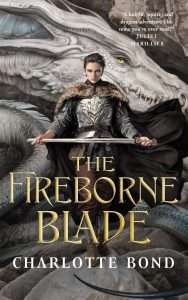 Novellas like The Fireborn Blade by Charlotte Bond are exactly the reason I love shorter form fiction. Engaging, fast-paced, inventive, and just a damned-fun few hours to spend engrossed in a story, The Fireborn Blade could have been the intro or extro story for an anthology, but is certainly strong enough to stand on its own two feet.
Novellas like The Fireborn Blade by Charlotte Bond are exactly the reason I love shorter form fiction. Engaging, fast-paced, inventive, and just a damned-fun few hours to spend engrossed in a story, The Fireborn Blade could have been the intro or extro story for an anthology, but is certainly strong enough to stand on its own two feet.
Read the rest of our review, here.
About the bookKill the dragon. Find the blade. Reclaim her honor.
It’s that, or end up like countless knights before her, as a puddle of gore and molten armor.
Maddileh is a knight. There aren’t many women in her line of work, and it often feels like the sneering and contempt from her peers is harder to stomach than the actual dragon slaying. But she’s a knight, and made of sterner stuff.
A minor infraction forces her to redeem her honor in the most dramatic way possible, she must retrieve the fabled Fireborne Blade from its keeper, legendary dragon the White Lady, or die trying. If history tells us anything, it’s that “die trying” is where to wager your coin.
Maddileh’s tale contains a rich history of dragons, ill-fated knights, scheming squires, and sapphic love, with deceptions and double-crosses that will keep you guessing right up to its dramatic conclusion. Ultimately, The Fireborne Blade is about the roles we refuse to accept, and of the place we make for ourselves in the world.
Read The Fireborn Blade by Charlotte Bond, recommended by AdrianNeed more book recommendations?We’ve been looking at the best in dark and grimdark SFF for years; here are the last few years posts to help you make sure that TBR will start teetering over you!
Best grimdark and dark SFF books of 2023Best grimdark and dark SFF books of 2022Best grimdark and dark SFF books of 2021Best grimdark and dark SFF books of 2020Best grimdark and dark SFF books of 2019The post The best dark fantasy and science fiction books of 2024 so far appeared first on Grimdark Magazine.
July 18, 2024
REVIEW: The Hod King by Josiah Bancroft
The Hod King is the third volume in Josiah Bancroft’s masterful Books of Babel tetralogy, combining the best features of the first two books of the series, Senlin Ascends and Arm of the Sphinx, while bringing new emotional depth to this tragic story.
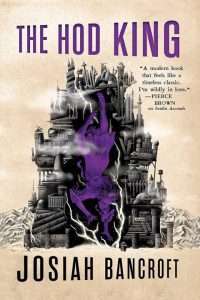 The lead protagonist of the series is Thomas Senlin, a rural schoolteacher on his honeymoon at the famed Tower of Babel. Although Senlin considers himself to be well-educated on all things Babel-related, his scholarly knowledge is no match for the overwhelming chaos of the real Tower. Senlin’s hubris gets the best of him as he immediately loses his bride, Marya, near the entrance of the Tower. The main plotline of the series concerns Senlin’s quest to rescue Marya from the labyrinthine Tower.
The lead protagonist of the series is Thomas Senlin, a rural schoolteacher on his honeymoon at the famed Tower of Babel. Although Senlin considers himself to be well-educated on all things Babel-related, his scholarly knowledge is no match for the overwhelming chaos of the real Tower. Senlin’s hubris gets the best of him as he immediately loses his bride, Marya, near the entrance of the Tower. The main plotline of the series concerns Senlin’s quest to rescue Marya from the labyrinthine Tower.
The Tower of Babel is an overwhelmingly massive structure, taller than any modern skyscraper. The building is divided into layers called “ringdoms,” each with its own peculiar culture and politics. In the first book, Senlin Ascends, our hero struggles to make his way upward through the ringdoms, believing that he will find his wife at the Tower’s famous baths. Senlin must overcome a series of Kafkaesque absurdities at each level to continue his ascent. By the second book, Arm of the Sphinx, the previously naïve Senlin is determined to take charge of his destiny, assembling a ragtag crew of makeshift pirates, traveling through this steampunk world on a stolen airship.
The Hod King strikes just the right balance between the Kafka-inspired absurdity of Senlin Ascends and the multi-point-of-view adventures of Arm of the Sphinx. More importantly, The Hod King deepens the emotional impact of the story as we finally encounter Marya. A year has passed since the newlyweds were first separated outside the Tower. Senlin’s bride may not be as he remembers, and the question arises of whether she actually wants to be “saved.”
Senlin’s personal struggles are set against the backdrop of the greater mysteries of the Tower, including those of the enigmatic Sphinx and the Hod King. As unlikely as it seems, Senlin’s journey may be inexorably linked with the fate of the Tower itself.
Among the many brilliant aspects of the Books of Babel, I am particularly impressed with Josiah Bancroft’s use of theatrical motifs to deepen the story. The author skillfully hones his theatre-related imagery in The Hod King, driving home the theme of finding our true selves behind the many literal and figurative masks that we wear throughout our lives.
The Hod King is arguably the best volume in Josiah Bancroft’s Books of Babel series. Grimdark readers will especially love the complexity of this dark world, as well as Bancroft’s consistently outstanding characterization. The tetralogy concludes with The Fall of Babel.
Read The Hod King by Josiah BancroftThe post REVIEW: The Hod King by Josiah Bancroft appeared first on Grimdark Magazine.
July 17, 2024
REVIEW: Navola by Paolo Bacigalupi
Navola is the latest adult fantasy from award-winning author Paolo Bacigalupi. An ambitious and richly detailed story, Navola is the coming-of-age tale of Davico, the heir to one of the most powerful families in the city. It has a wealth of vicious political intrigue, complex characters, and a fair amount of bloody violence. Described as ‘The Godfather meets Game of Thrones,’ Navola will undoubtedly hold great appeal for grimdark fans.
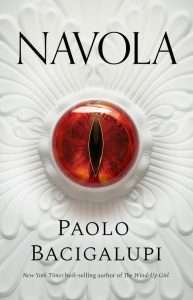 Set in a renaissance era fantasy world, in the titular city of Navola, the Regulai family has risen far from their humble mercantile beginnings. The di Regulai might be bankers, not princes, but they have wealth, power, and influence, which spread across the map. Nearing his majority, Davico di Regulai is soon expected to take over from his brilliant father. But Davico is ill-suited for the role – too trusting, kind, and gentle. He does not see the spreading plots of his family’s enemies and must open his eyes to the threats surrounding them before it is too late.
Set in a renaissance era fantasy world, in the titular city of Navola, the Regulai family has risen far from their humble mercantile beginnings. The di Regulai might be bankers, not princes, but they have wealth, power, and influence, which spread across the map. Nearing his majority, Davico di Regulai is soon expected to take over from his brilliant father. But Davico is ill-suited for the role – too trusting, kind, and gentle. He does not see the spreading plots of his family’s enemies and must open his eyes to the threats surrounding them before it is too late.
I ended up enjoying Navola immensely despite initially misjudging the novel. Although I had expected a more significant draconian involvement than there is, the dragon eye on the cover does play an important role in the book. I also had to adjust my expectations slightly because I had anticipated Navola to be different structurally due to the Game of Thrones comparison. Navola is a first-person single point-of-view novel and appears to be a standalone fantasy, not the first in an epic series. It is not very similar to Games of Thrones in that respect. But in terms of vicious twists and turns, people not being who they appear to be? Navola has that in droves. It is a multi-layered and complex narrative which is hugely entertaining. I might be just as naïve as our protagonist, Davico, but even reading Navola thinking, ‘there’s a twist somewhere,’ I did not see most of these coming.
Bacigalupi also has some very dark parts to this story. If you were to list ‘bad things people could do to one another,’ Navola would probably tick many of them off. There is a slave trade, and sweet Davico tries his hardest to ignore that his father purchased his mistress for the role. There is also some very inventive violence and psychological torture shown. None of this feels needlessly included in the narrative, but it is sometimes rightly an uncomfortable read because of it. One of the bloodier moments in Navola triggered a lively conversation in the Grimdark Magazine group chat about using eggs as an analogy for eyes and whether we thought eyes would pop like an egg yolk or not. Although Bacigalupi goes to some dark places in the story, Navola is not an unrelentingly dark tale. Davico is a mostly likable protagonist (and bless Davico, the main thing I found frustrating about him is how often he is distracted by his, ahem, ‘root’), and the bawdy and humorous moments in the story give it some much-needed balance.
I rarely read standalone novels and still found Navola to be a satisfying story. However, Bacigalupi deliberately leaves the ending reasonably open. Concluding the narrative in this way might suggest that Bacigalupi could return to this world in the future, or maybe Bacigalupi has finished it this way for the reader to draw their conclusions on how particular character arcs end. Navola takes place in an exciting world, and although Davico’s story appears finished, I would like to read more about the other characters should Bacigalupi being considering more stories set here. Davico’s sister Cecilia, for example, is one I would love to have more insight into or even to learn more about some of the other key families in Navolese society.
Thank you very much to Paolo Bacigalupi and the Head of Zeus / Ad Astra team for sending over an ARC of Navola for review.
Read Navola by Paolo BacigalupiThe post REVIEW: Navola by Paolo Bacigalupi appeared first on Grimdark Magazine.
July 16, 2024
REVIEW: Lake of Darkness by Adam Roberts
Lake of Darkness is the new hard science fiction novel by Adam Roberts that asks whether an intelligent being could evolve inside the infinite darkness of a black hole. As the novel opens, two starships are in orbit around a black hole known as QV Tel. Although the crews have been sent to gather data near the event horizon of the black hole, they are suffering from severe physical and psychological trauma after traveling near the speed of light.
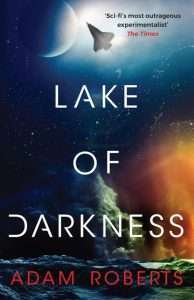 The journey takes an especially large toll on one of the starship captains, Alpha Raine, who suffers a complete psychological breakdown, murdering his crew. While others question his sanity, Raine believes he is receiving communication from a being that resides within the black hole itself. Raine undergoes evaluation by Saccade, the other lead character of Lake of Darkness, a historian of twentieth century Earth culture specializing in the psychology of serial killers.
The journey takes an especially large toll on one of the starship captains, Alpha Raine, who suffers a complete psychological breakdown, murdering his crew. While others question his sanity, Raine believes he is receiving communication from a being that resides within the black hole itself. Raine undergoes evaluation by Saccade, the other lead character of Lake of Darkness, a historian of twentieth century Earth culture specializing in the psychology of serial killers.
The title of the novel is an allusion to King Lear by William Shakespeare: “Frateretto calls me and tells me Nero is an angler in the lake of darkness. Pray, innocent, and beware the foul fiend.” Frateretto is the name of a devil, and the Nero reference points back to Chaucer’s Canterbury Tales, where the Roman Emperor is found fishing in hell. This quote accurately captures the pitch-black vibes and demonic overtones of Lake of Darkness. Although this is a hard sci-fi novel saturated with astrophysics, Roberts delves just as deeply into both the philosophical and theological implications of a black hole developing sentient life.
Adam Roberts is a professor of nineteenth century literature at Royal Holloway, yet he clearly knows his physics. The author’s grasp of challenging concepts from general relativity to cosmology is spot on. The true genius of Lake of Darkness is how Roberts constructs a story from the so-called black hole information paradox, which arises when applying a combination of general relativity and quantum mechanics to black hole physics. The paradox concerns the ultimate fate of information sucked into black holes: when a black hole decays due to Hawking radiation, is the information truly lost or could it be re-emitted? More specifically, could the information serve as fuel for evolving an intelligent entity within the black hole itself?
Although Lake of Darkness is a heavy read, there are also some lighthearted moments, especially related to the characters’ misunderstanding of twentieth century Earth. For example:
“…whatever the actual name of the first individual to walk on the Earth’s moon, it was clearly not Arm-Strong. ‘That’s a title, not a name: clearly it reflects the warrior ethos of that belligerent and martial age. Whoever they sent to the moon, he would be a great hero—a masculine figure, since antique Earth valued the male over the female—and an individual of immense physical strength. Hence strong-of-the-arm.’”
Lake of Darkness is not a casual read by any means, but it is highly rewarding for readers willing to devote the necessary effort. It is rare to find a book that delves so deeply into science, philosophy, religion, and psychology, while also delivering a compelling story with complex, morally gray characters. Personally, I found myself unable to resist the gravitational pull of this dense yet darkly alluring opus.
Read Lake of Darkness by Adam RobertsThe post REVIEW: Lake of Darkness by Adam Roberts appeared first on Grimdark Magazine.
REVIEW: The Boys Season 4
Last Updated on July 17, 2024
The Boys are back and this season is as brilliant, disgusting, and insane as the previous seasons – perhaps more disgusting in places and that is certainly a high bar to reach. Based on the Garth Ennis comic of the same name, The Boys S4 continues the adventures of Billy Butcher (Karl Urban – Dredd, Lord of the Rings, Star Trek) and his team of misfits as they plot to take down the increasingly unhinged Homelander (Anthony Starr – give the man all the awards).
 In The Boys S4, Butcher seems to be on his last legs. Given months to live following his abuse of compound V in the previous season, he’s still intent on taking down Homelander and other supes and saving his late wife’s son, Ryan, who he wants to protect from Homelander’s corruption. His illness has him seeing his dead wife and he also spends a lot of time with an old friend, played by the always amazing Jeffrey Dean Morgan (Watchmen, The Walking Dead) but he still has enough about him to take on supes and so he teams up with MM and the others as they try to stop a plot to kill the president. Hughie has his own struggles this season. He knows now that he can help as a regular guy but he is distracted by the return of his mother and his father being in a coma. The scenes with his father in the hospital are some of the strongest in the whole series. Simon Pegg plays the role to perfection and shows us that even the grimmest, darkest of tales need a heart in order for writers to pull it out and crush it in front of the watching audience.
In The Boys S4, Butcher seems to be on his last legs. Given months to live following his abuse of compound V in the previous season, he’s still intent on taking down Homelander and other supes and saving his late wife’s son, Ryan, who he wants to protect from Homelander’s corruption. His illness has him seeing his dead wife and he also spends a lot of time with an old friend, played by the always amazing Jeffrey Dean Morgan (Watchmen, The Walking Dead) but he still has enough about him to take on supes and so he teams up with MM and the others as they try to stop a plot to kill the president. Hughie has his own struggles this season. He knows now that he can help as a regular guy but he is distracted by the return of his mother and his father being in a coma. The scenes with his father in the hospital are some of the strongest in the whole series. Simon Pegg plays the role to perfection and shows us that even the grimmest, darkest of tales need a heart in order for writers to pull it out and crush it in front of the watching audience.
For some, The Boys S4 will be a bit too on the nose regarding current world politics. The show has never shied away from tackling real-world issues and the partisan politics and misinformation throughout the show leave the viewers in no doubt of the writers’ views on current world affairs. It is something that may turn some viewers away depending on their own views but for me, I was pleased to see a show that didn’t want to water anything down. The Boys is known as a hard-hitting show in every sense of the phrase and if you have stuck around for exploding penises, supe orgies, and Homelander jerking himself off at the top of a tower, then I’m sure you’re in for the long haul. If you thought this season wouldn’t be able to produce its own sickening moments, then wait for Web Weaver and pretty much every scene that character (or at least the suit) is in. If it is the brilliant acting and powerful scenes you’re after, then Simon Pegg’s scene-stealing episodes and Anthony Starr putting in what has to be one of the best pieces of acting in the entire run of The Boys are for you. The shot of Homelander soaked in blood is an iconic one that will last long in the memory. Throughout the season, I had times where I pitied Homelander, cheered for A-Train, and was amazed by Tilda Swinton’s secret inclusion. The Boys S4 and the brilliant Gen-V are proving that there’s life in the world of this superhero series yet, with one more season to go, let’s see if they can stick that superhero landing.
The Boys S4 continues the show’s excellent run. Ripe with political commentary, explosive action, shocking powers, and enough heart to make you give a shit, this is still one of the best shows on TV. Filled with anti-heroes and villains to you love to hate, this is perfect for grimdark fans who enjoy gritty side of superheroes.
Watch The Boys Season 4The post REVIEW: The Boys Season 4 appeared first on Grimdark Magazine.

 Read on Amazon
Read on Amazon

